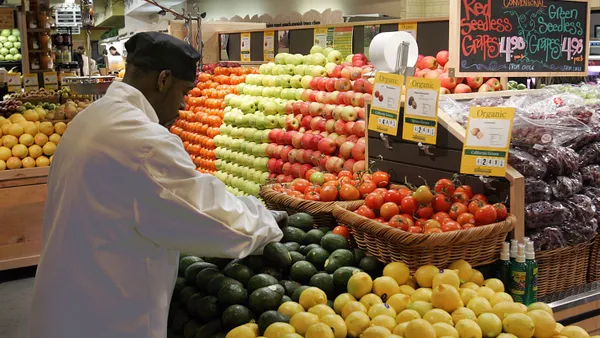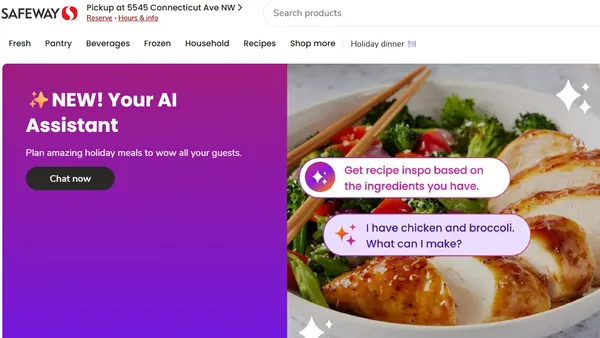Dive Brief:
- Walmart is testing a kitchen robot assistant named “Flippy” at its Bentonville, Arkansas headquarters to see if it could work in its in-store delis, according to Yahoo Finance. Flippy is the world’s first autonomous kitchen assistant powered by Miso Robotics, an artificial intelligence startup.
- Flippy automates the frying process for basic deli items like chicken tenders, mozzarella sticks and potato wedges. A store associate places the frozen food on the rack and Flippy’s visual recognition technology recognizes the product and puts it in cooking oil. Then it shakes the basket to cook it evenly. When it’s done cooking, the robot moves the basket to the drip rack. The associate then tests the internal temperature and adds seasoning.
- The robot made its first debut flipping burgers at a Caliburger restaurant in Pasadena, California. The robot was also hired to work at Dodger Stadium in Los Angeles. During the World Series, Flippy cooked up 17,000 pounds of chicken tenders and tater tots. It’s able to churn out up to eight baskets of fried food at a time.
Dive Insight
Walmart’s decision to automate in the deli and prepared food section of their stores shows that the retailer, like many others, is focused on saving time and money across its operations.
Prepared food sales are thriving right now, with innovation being driven by younger shoppers that crave fresh, healthy, decently priced offerings. But a steep increase in demand means retailers are stretched to produce meals in an efficient matter while still delivering quality. In-store dining and takeout of prepared foods in grocery stores has grown 30% since 2008 and 40% of the U.S. population purchases prepared foods from grocery stores, according to a report by NPD Group.
However, the prepared food selection does present challenges for grocers including spoilage and labor-intensive work. Senior director of global business development at Digimarc Corporation Art Powell, in a recent column for Food Dive, explains technological advancements that increase efficiency are key to keeping the prepared food trend hot. Walmart’s introduction of Flippy is its answer to this challenge.
This isn’t the first robot Walmart has tested. Earlier this month, the retailer announced plans to roll out 360 autonomous floor-cleaning robots inside Walmarts across the U.S. by the end of January. Prior to this, Walmart began piloting autonomous delivery, a self-driving chauffeur and Alphabot, an automated fulfillment system.
Automation in grocery has evolved significantly over the past year with the development of cashier-less stores, automated warehouses, driverless delivery and robotics that perform daily tasks. Walmart and other retailers have stressed that automation doesn’t take a worker’s job but instead allows the worker to focus their efforts on customer service. Recent research, however, paints a more complex picture: A recent study by OECD found that 14% of jobs in developed countries are at risk from automation, with most being in the fulfillment, distribution and warehouse sector. Another 32% of jobs, the report noted, will likely see "significant changes" in the years ahead.
Automation in grocery stores isn’t slowing down for Walmart or other retailers. A report by Research and Markets expects automation to be worth more than $18.9 billion by 2023. With all the innovations in automation just this year, retailers are on their way to hitting this number.










